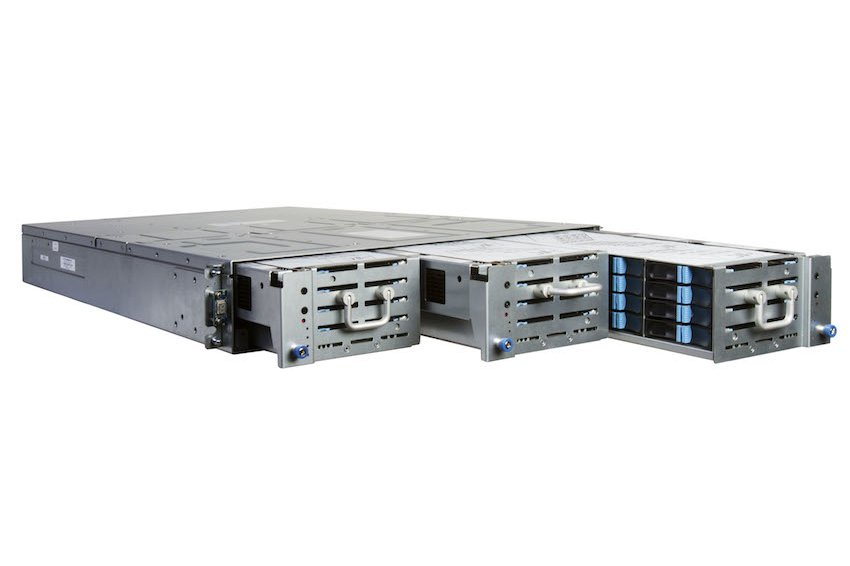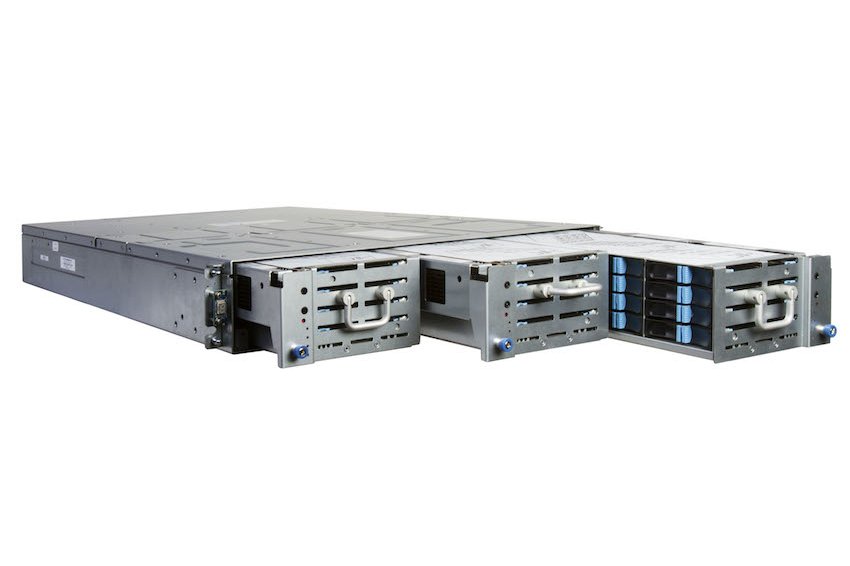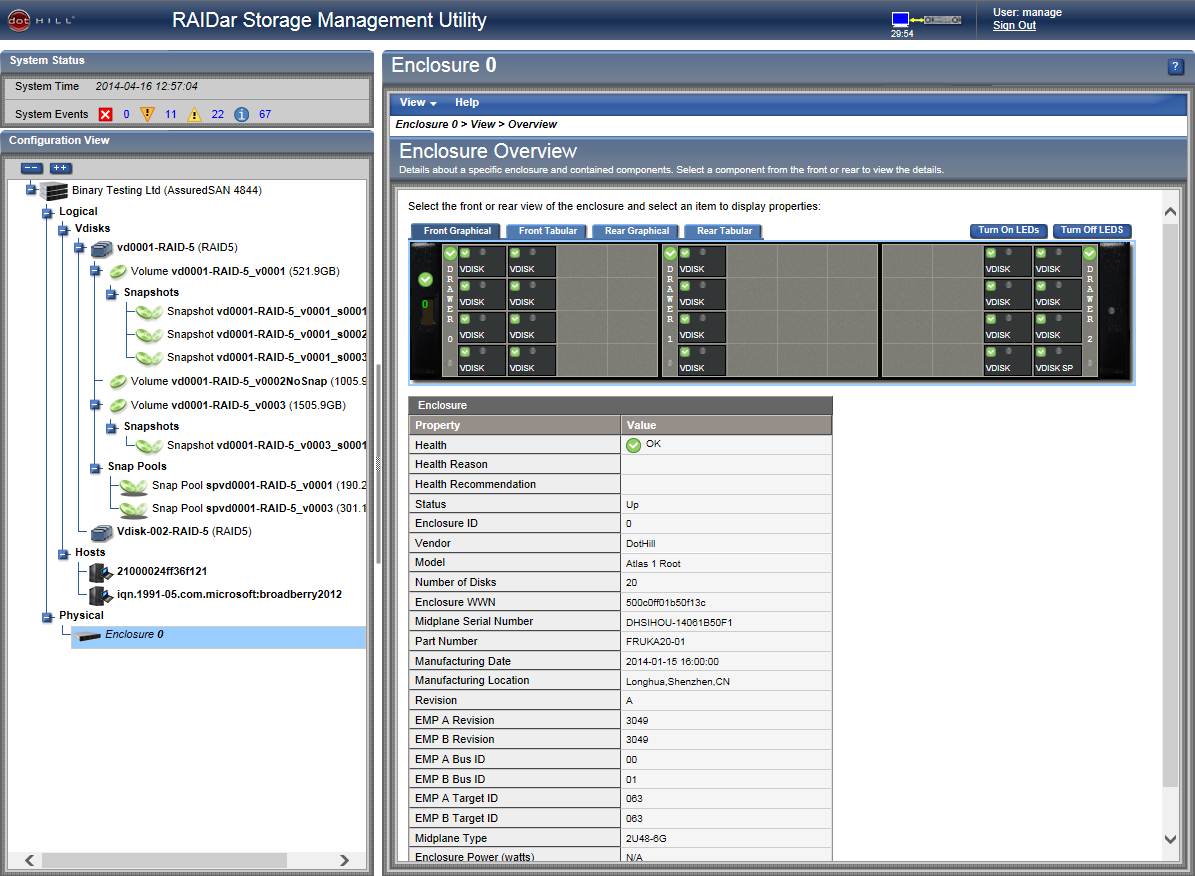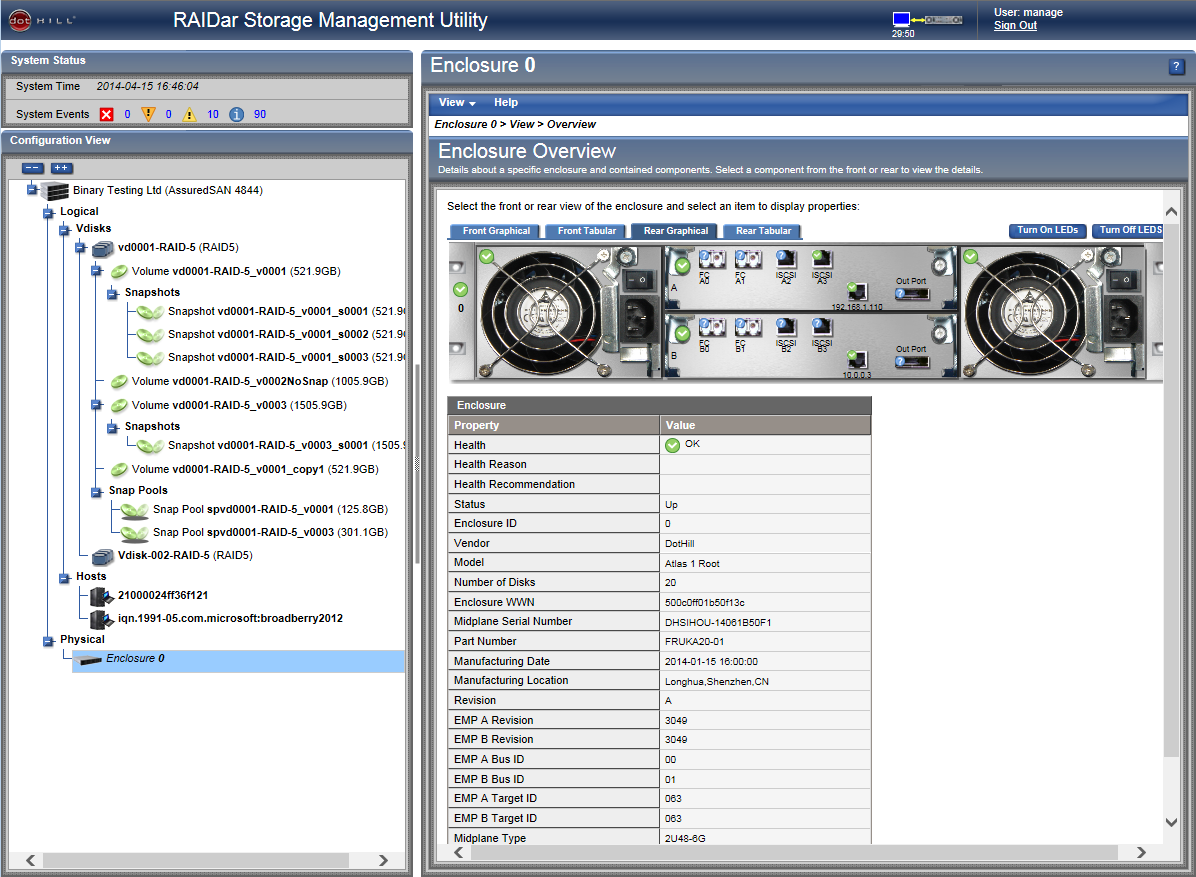Dot Hill AssuredSAN Ultra48 review
Cramming 48 SFF drives into 2U of rack space marks an industry first


No other vendor can pack this many drives into a 2U chassis. Dual support for 16Gbps FC and 10GbE IP SANs makes the Ultra48 versatile and easy to deploy.
-
+
Massive storage density; 16Gbps FC and 10GbE iSCSI support; Good performance; High expansion potential
-
-
RAID array migration not supported

Dot Hill's innovative design allows the Ultra48 to pack more storage into less space than any competing devices. Instead of spreading the drives across the front panel in the traditional manner, the Ultra48 employs three extendable drawers each with 16 SAS 2 hot-swap SFF bays.
The drawers can be pulled out without disturbing existing RAID arrays allowing more drives to be added on the fly. All the bays face inwards allowing full access even if the system is in a rack at the end of a row next to a wall.
Clever design doesn't stop there as the Ultra48 controllers support both 16Gbps FC and 10GbE operations (there's also a version with 12Gbps SAS host ports). The four ports on each controller can be configured to accept 16Gbps FC or 10GbE SFP+ transceivers or a mix of both.
Redundancy is total as the chassis has two hot-plug power supplies with integral fans and the dual controllers run in active/active mode with cache mirroring. Each controller has 6GB cache memory and uses Dot Hill's EcoStor combo of super-capacitor and CompactFlash card to protect the cache contents.

Storage is spread across three extendable drawers with each offering 16 hot-swap SFF bays
Deployment and vdisks
The RAIDar web interface is well designed and provides easy access to all storage functions. It offers a heap of graphical views of the front and rear of the system plus a map showing which bays are occupied.
Vdisks (virtual disks) are used to provision storage where you select the member drives and decide on a RAID array type. During creation you can step through choosing member drives, the number of volumes it should contain, their size and which data ports they should be mapped to for host access.
You can add hot-spares to selected arrays and if vdisk space gets tight you can expand them into available drives. However, Dot Hill still doesn't support migration from one RAID array type to another.

The RAIDar web interface provides a handy graphical map to keeps tabs on all those drives
AssuredSnap and AssuredCopy
DotHill's AssuredSnap feature creates point-in-time snapshots of selected volumes which are stored in separate pools on the array where they can be used for fast restores. The price we've shown doesn't include snapshots but you can apply a 60-day trial license from the web interface and have a play with them. The Ultra48 supports up to 1,024 snapshots and enabling these costs a further 1,516.
You can create snapshots during vdisk configuration, run on-demand snapshots manually or schedule them to run at regular intervals. Snapshots of multiple volumes can be created quickly simply by selecting the vdisk they're contained in.
Dot Hill's AssuredCopy creates identical copies of volumes which can then be brought online for use in testing or data archiving. Volume copies can be run immediately, scheduled for later on or run at regular intervals. AssuredCopy is optional feature but enabling it to support 1,024 copies only costs an extra 640.

Each controller has four SFP+ host ports and here we've configured them for dual 16Gbps FC and 10GbE IP SAN operations
Expansion and host port options
The controllers each have a 6Gbps SAS expansion port for daisy-chaining disk shelves and with dual controllers, you can use multiple paths for fault tolerant links. The Ultra48 supports three 48-drive expansion shelves for a total of 192 drives.
Configuring the SFP+ host ports is a simple task as one CLI command determines their mode. You can have all eight ports on both controllers operating as 16Gbps FC or as 10GbE IP SAN.
Alternatively, you can choose a mixed mode where the first two ports on each controller are 16Gbps FC and the second pair are 10GbE. We remotely accessed the array over SSH using PuTTY and changed the mode in seconds.

The Ultra48 supports up to 1,024 snapshots for fast point-in-time copies of volumes
Performance
For testing we used a Broadberry Data Systems rack server with dual 2.6GHz E5-2670 Xeons, 48GB of DDR3 and running Windows Server 2012 R2. We added a QLogic QLE2562 dual-port 8Gbps FC HBA and used a direct connection to the Ultra48 array.
Raw sequential read performance over 8Gbps FC was good. We used Iometer with a 50GB test file and watched it record a steady speed of 785MB/sec or 6.1Gbits/sec. Raw write performance wasn't so hot with our test server returning 440MB/sec. To test maximum IOPS we used a 4KB Iometer transfer request and saw around 34,000 IOPS.
We then added a second Broadberry dual Xeon E5-2400 server also equipped with a QLogic 8Gbps FC card. With both servers running Iometer on dedicated volumes in the same RAID-5 array, we recorded a cumulative raw sequential read speed of 1490MB/sec a tidy 11.6Gbits/sec.
We tested over 10GbE and reconfigured the host ports accordingly. With our dual 2.6GHz E5-2670 Xeon system connected via its Intel 10GbE port, Iometer returned an impressive sequential read rate for a 1.5TB target of 963MB/sec. With an Iometer 4K read request set we also recorded a high 56,000 IOPS for the target.
Conclusion
The AssuredSAN Ultra48 and its innovative design sets new standards for rack storage density. It offers high-performance and for a dual 16Gbps FC, 10GbE IP SAN appliance it's good value too.
Verdict
No other vendor can pack this many drives into a 2U chassis. Dual support for 16Gbps FC and 10GbE IP SANs makes the Ultra48 versatile and easy to deploy.
Chassis: 2U rack
Storage: 48 x 6Gbps SAS SFF hot-swap drive bays
Power: 2 x 928W hot-plug PSUs
Two hot-swap controllers each with the following:
Memory: 6GB cache with super-capacitor and CompactFlash card
RAID support: RAID0, 1, 3, 5, 6 10, 50
Data ports: 4 x 16Gbps FC/10GbE SFP+
Management: 10/100 Ethernet
Expansion: 6Gbps SAS port
Other ports: Mini-USB CLI port
Management: Web browser
Options: AssuredSnap (1,024 snapshots), £1,156; AssuredCopy (1,024 copies) £640 (all ex VAT)
Get the ITPro daily newsletter
Sign up today and you will receive a free copy of our Future Focus 2025 report - the leading guidance on AI, cybersecurity and other IT challenges as per 700+ senior executives
Dave is an IT consultant and freelance journalist specialising in hands-on reviews of computer networking products covering all market sectors from small businesses to enterprises. Founder of Binary Testing Ltd – the UK’s premier independent network testing laboratory - Dave has over 45 years of experience in the IT industry.
Dave has produced many thousands of in-depth business networking product reviews from his lab which have been reproduced globally. Writing for ITPro and its sister title, PC Pro, he covers all areas of business IT infrastructure, including servers, storage, network security, data protection, cloud, infrastructure and services.
-
 Nvidia braces for a $5.5 billion hit as tariffs reach the semiconductor industry
Nvidia braces for a $5.5 billion hit as tariffs reach the semiconductor industryNews The chipmaker says its H20 chips need a special license as its share price plummets
By Bobby Hellard Published
-
 Business leaders are having a crisis of confidence over data literacy
Business leaders are having a crisis of confidence over data literacyNews A Salesforce survey reveals business leaders don't trust their data, or their ability to make the most of it
By Emma Woollacott Published
-
 MITRE CVE program handed last minute reprieve amid funding lapse concerns
MITRE CVE program handed last minute reprieve amid funding lapse concernsNews The MITRE Corporation's Common Vulnerabilities and Exposures (CVEs) database has been handed a last minute reprieve amid concerns over funding.
By Rory Bathgate Last updated